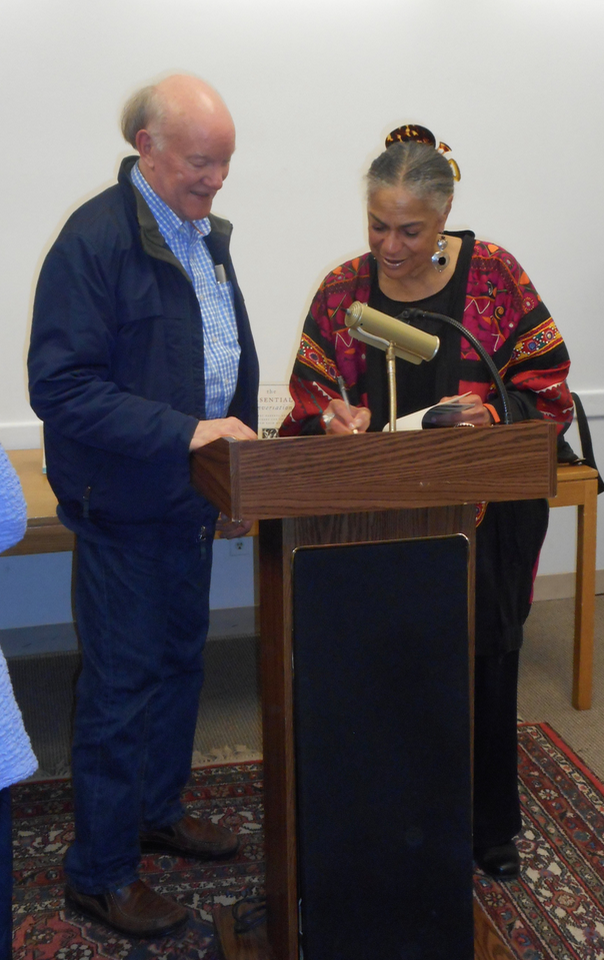When Professor Sara Lawrence-Lightfoot returned to the South End library for another one of her popular talks in early March, the subject was how we leave, exit, depart or retreat from our daily interactions, whether personal, professional, or merely neighborly. Author of the 2012 Exits: The Endings that Set Us Free, Lawrence-Lightfoot told her audience that she had always been curious about leave-takings, large and small. "Our culture applauds beginnings," she said , favoring a "tilt to the future" and a "readiness to seize opportunity." Exits are therefore seen as "negative spaces," as a "time to move on," often in the dark of night.
The long-time South End resident, who holds the Emily Hargroves Fisher Endowed Chair of Education at Harvard University where she has been on the faculty since 1972, finds the culture's disregard for exits "troublesome." Especially because, she says, we have a society where leaving is so prevalent, as evidenced by a divorce rate of fifty percent, and so many immigrants who had to leave much behind. "The history of the United States is defined by leave-takings," Lawrence-Lightfoot pointed out, "by the slaves' and native Americans' forced departures," as well as by other forces, often beyond our control, like economic crises or global and natural disasters.
Lawrence-Lightfoot, the recipient of many prestigious prizes and awards and the author of ten books, said she is intrigued by the ordinary, daily exits as well as bigger ones, such as the rupture of friendships, the departure of children for college. She said when her own son, now 33 and "a strapping handsome black man" leaves the house, she tells him, "be careful," and is holding her breath. "Will I see him again?" she always wonders, or "is it the last time?"
"Managing the big goodbyes must be relational to the small ones, so it matters how exits are practiced," said Lawrence-Lightfoot, who won a MacArthur Prize in 1984 and was named the Margaret Mead Fellow by the Academy of Political and Social Sciences in 2008. "So do the rituals that accompany them, how one ends and another begins. Is it a victory or a defeat, or is it both?" She emphasized the importance of revisiting how an ending happens, what provoked it to occur at that moment, and how was it communicated and to whom? "Exits are accompanied by feelings of loss as well as liberation, and it is worthy of deep exploration," she added.
Her children, too, became interested in the subject, she said, asking her how she said goodbye to her students at the end of the semester. Her daughter suggested she "stop sounding like a mom." Her son proposed she put her farewell in a song, advice she took: Lawrence-Lightfoot, whose chair endowed at Harvard will be re-named the Sara Lawrence-Lightfoot Chair of Education upon her retirement, has sung farewells to her students ever since, a ritual she also engages in when giving talks and during book tours.
During the question-and-answer session, a woman in the audience stood up, saying she had six children, some in high school, whose friends recently died violent deaths from shootings and car crashes. She doesn’t know how to give advice to them, she said, tearing up. How should she talk with them about these endings? Lawrence-Lightfoot said she had no magic words but suggested it would be important to do a lot of talking about it, to go to the memorial services and be quiet so the children will talk. "They need to be part of the weeping community, and pay attention to the power of ritual, ceremony," she said. "It is horrific to see young persons die like that, but you have to let your children see that you are grieving with them."
And then Professor Lawrence-Lightfoot sang her goodbye to the audience at the South End library with the Song of Jeremiah from Iliad.She introduced it by explaining it was transformed as a negro spiritual from There’s No Balm in Gilead to There Is a Balm in Gilead: To make the wounded whole; There's power enough in heaven; To cure a sin-sick soul.
The author's next book, Growing Each Other Up: When Our Children Become Our Teachers, will come out in the fall of this year. Lawrence-Lightfoot has agreed to return to the library to talk about it at that time.





